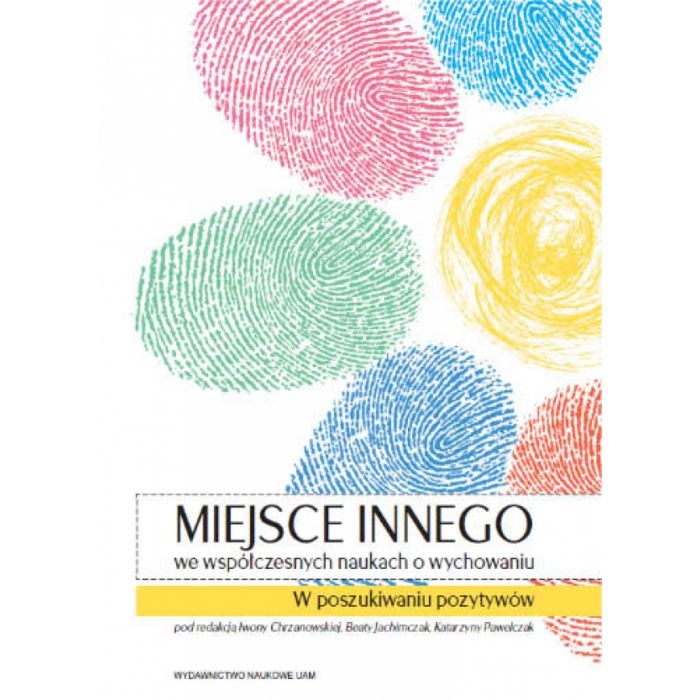Miejsce Innego we współczesnych naukach o wychowaniu. W poszukiwaniu pozytywów
- In Stock: in stock
- ISBN: 978-83-232-2530-0
- Category: OUTLET, Psychology and Education
- Year of publication: 2014
PLN 32.00
Publikacja odnosi się do problematyki wykluczenia, marginalizacji, ale również akceptacji i tolerancji w stosunku do szeroko pojmowanej inności. Inność rozumiana najczęściej jako odmienność potrzeb, możliwości, wzorców funkcjonowania w przestrzeni społecznej stała się płaszczyzną interdyscyplinarnego dyskursu. Zainteresował on reprezentantów nauk humanistycznych, społecznych, medycznych, technicznych. Ukazał różnorodność i wielopłaszczyznowość możliwego rozumienia i odczytywania tytułowej inności. Czy inność/odmienność jest przeszkodą w osiągnięciu życiowo istotnych celów? Czy może jest szansę budowania porozumienia i wspólnej przestrzeni? Autorzy przekonują do swoich racji, czasem wręcz prowokują. Czy przekonają – Czytelnik sam zdecyduje. Autorami tekstów są autorytety, ale również młodzi, rozpoczynający pracę naukową badacze. Z refleksji jednych i drugich można czerpać nie tylko rzetelną wiedzę, ale i „gotowe” pomysły badawcze. Autorami są również praktycy, którzy wiedzę akademicką konfrontują na co dzień z rzeczywistością, stają przed problemami, które muszą rozwiązywać jako pedagodzy, psychologowie, terapeuci, architekci dosłownie i w przenośni projektujący naszą wspólną przyszłość.
This book deals with the issues of exclusion and marginalization, as well as acceptance and tolerance with respect to broadly understood otherness. Otherness which is usually conceived as the state ofhaving different needs, capabilities and patterns of functioning in the social sphere has become a topic of international discourse. It has become an area of interest for the representatives of humanities as well as social, medical and technological sciences. This discourse has shown the variety of ways in which otherness could be understood as well as its multidimensionality. Is the fact of being different, or otherness, an obstacle to achieving important goals in life? Or is it an opportunity for developing understanding and creating a common space? The authors argue their case and sometimes even provoke the reader. Are they convincing? It is for the reader to decide. The texts were not only written by authorities, but also by young researchers who have just embarked on their academic careers. The reflections of the former and the latter are a source of reliable knowledge and “ready-to-use” research ideas. Among the authors are also practitioners who test their academic knowledge against reality on an everyday basis and who face problems which they have to solve as educators, psychologists, therapists and architects literally and figuratively designing our common future.This book deals with the issues of exclusion and marginalization, as well as acceptance and tolerance with respect to broadly understood otherness. Otherness which is usually conceived as the state ofhaving different needs, capabilities and patterns of functioning in the social sphere has become a topic of international discourse. It has become an area of interest for the representatives of humanities as well as social, medical and technological sciences. This discourse has shown the variety of ways in which otherness could be understood as well as its multidimensionality. Is the fact of being different, or otherness, an obstacle to achieving important goals in life? Or is it an opportunity for developing understanding and creating a common space? The authors argue their case and sometimes even provoke the reader. Are they convincing? It is for the reader to decide. The texts were not only written by authorities, but also by young researchers who have just embarked on their academic careers. The reflections of the former and the latter are a source of reliable knowledge and “ready-to-use” research ideas. Among the authors are also practitioners who test their academic knowledge against reality on an everyday basis and who face problems which they have to solve as educators, psychologists, therapists and architects literally and figuratively designing our common future.
Write Your Own Review
| Detailed information | |
|---|---|
| Publication Version | printed |
| Format | 17,0 x 24,0 |
| Title (EN) | The Place of the Other in Contemporary Educational Sciences. In Search for Positives |
| Type of publication | Monografia |
| Edition | I |
| Series | Psychologia i Pedagogika nr 187 |
| ISSN | 0083-4254 |
| ISBN | 978-83-232-2530-0 |
| Number of pages | 528 |
| Number of publishing sheets | 34,00 |
| Type of binding | paperback |
